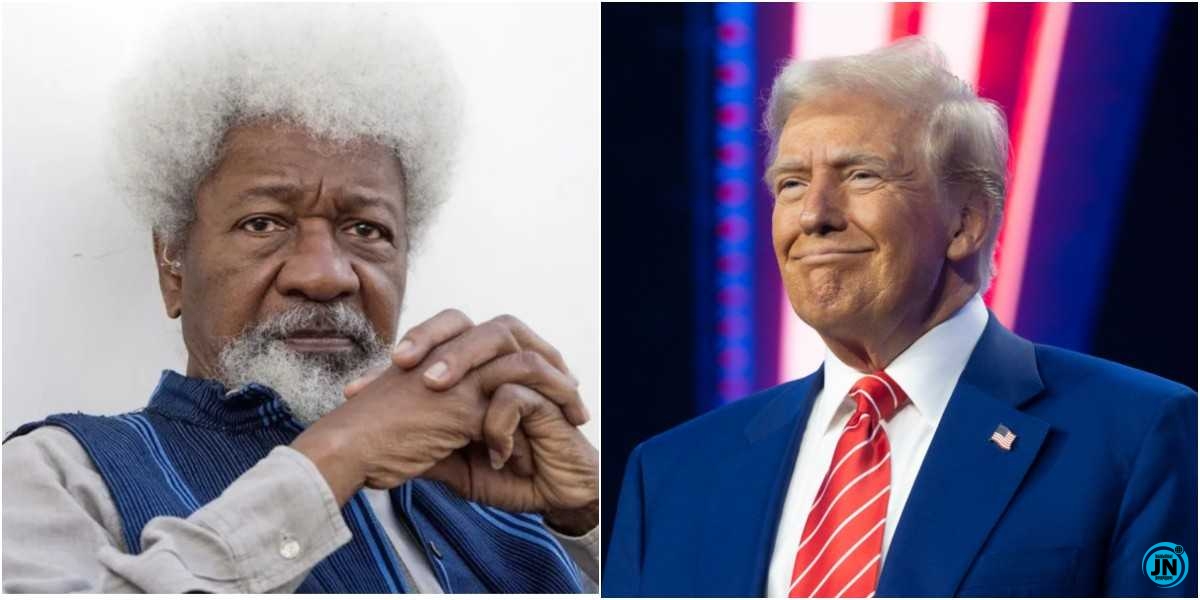
Renowned Nobel laureate and literary icon, Prof. Wole Soyinka, has once again found himself at the center of national and international conversations after reports resurfaced confirming that he destroyed his United States green card in 2016 following the shocking victory of Donald Trump in the U.S. presidential election.
The revered playwright, poet, and activist—known for his strong moral convictions and fearless criticism of global politics—had publicly vowed before the election that he would cut up his green card if Trump emerged as president. For Soyinka, the decision was a symbolic act of protest against what he described as a looming era of intolerance, division, and xenophobia under Trump’s leadership.
At the time, his bold statement drew both praise and ridicule. Supporters hailed his courage and integrity, while critics mocked the move as unnecessary drama. Yet, in true Soyinka fashion, the Nobel laureate kept his word without hesitation once the results were announced.
‘I Have Disengaged from the United States’ — Soyinka Stands by His Word
Speaking shortly after Trump’s victory, Soyinka revealed that he had indeed destroyed his green card and “disengaged” completely from the United States. During a conference in South Africa, he confirmed that his symbolic protest was not an empty threat but an act of personal and ideological conviction.
“I have already done it; I have disengaged from the United States. I have done what I said I would do,” Soyinka declared. “I had a horror of what is to come with Trump… I threw away the green card, and I have relocated, and I’m back to where I have always been.”
For many, this moment marked one of the most memorable political protests ever made by a Nigerian intellectual, showing that even the privileges of global residency could be sacrificed for the sake of principle.
A Protest Against Xenophobia and Division
Soyinka later clarified that his decision was not an emotional reaction but a deliberate moral stance against Trump’s divisive campaign rhetoric. He cited the former president’s repeated derogatory remarks about Blacks, Hispanics, Muslims, and immigrants as the key motivation behind his symbolic “Wolexit.”
“My decision,” Soyinka explained, “was about conscience. I refused to be identified with an administration that promotes fear and division.”
He further noted that although he no longer wished to be a permanent resident, he would still visit the United States occasionally, but only under a regular visa—just like any other foreign national.
Understanding Soyinka’s Green Card Relinquishment
A U.S. green card, officially known as a Permanent Resident Card, grants holders the right to live and work in the United States indefinitely. However, individuals may voluntarily renounce their status by filing Form I-407 with the U.S. Citizenship and Immigration Services (USCIS) or by formally expressing their intent to abandon it.
Soyinka’s act of tearing up the card was, therefore, both a symbolic and practical renunciation of U.S. residency. His “Wolexit” served as a rare gesture of political protest in a world where most people seek to acquire, rather than abandon, U.S. residency privileges.
Many commentators later described his action as a “literary statement” in itself—echoing his lifelong resistance to oppression, injustice, and hypocrisy.
US Revokes Soyinka’s Visa in 2025 — A Twist Nearly a Decade Later
Fast forward to nearly ten years after that bold act, and Soyinka’s relationship with the United States appears to have come full circle. Reports emerging in late October 2025 revealed that the U.S. government officially revoked his non-immigrant visa.
According to a letter dated October 23, 2025, issued by the American Consulate-General in Lagos, Soyinka was instructed to submit his passport for visa cancellation. The document cited “additional information” obtained after the visa was issued, though the exact reasons remain unclear.
In a statement to journalists, the literary icon disclosed that he had only applied for the visa to travel to the U.S. after receiving correspondence from the Internal Revenue Service (IRS) regarding a tax audit. Soyinka said he intended to clarify the matter personally to avoid being misrepresented as a “tax dodger.”
“It was purely administrative,” he explained. “I needed to travel to resolve a bureaucratic issue. But I suppose the decision to revoke the visa only reinforces what I already knew—my relationship with the U.S. has effectively ended.”
A Long, Storied Relationship Draws to a Close
Soyinka’s ties with the United States stretch back to the 1990s when he received his first green card during a sabbatical at Emory University, facilitated by former U.S. President Jimmy Carter. Over the decades, he lectured, taught, and collaborated with leading universities and cultural institutions across the U.S., earning respect as a global advocate for human rights and artistic freedom.
However, the events of 2016—and the recent visa revocation—seem to mark the closing chapter of that long association. What began as a mutually respectful academic relationship has now transformed into a story of ideological separation and personal conviction.
For many admirers, Soyinka’s journey underscores his lifelong message: that integrity, not comfort or privilege, defines the true measure of a man. As one social media user aptly put it, “Soyinka didn’t just tear a green card; he tore through hypocrisy and stood firm on his beliefs.”
Whether viewed as defiance or principle, Wole Soyinka’s decision remains one of the most symbolic acts of conscience in modern African intellectual history.